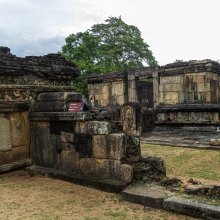Nihshanka, Niḥśaṅka, Nissaṅka, Nissanka, Nissamka, Nishshanka, Nishshamka, Nihshamka: 19 definitions
Introduction:
Nihshanka means something in Buddhism, Pali, Hinduism, Sanskrit, Jainism, Prakrit, Marathi, Hindi. If you want to know the exact meaning, history, etymology or English translation of this term then check out the descriptions on this page. Add your comment or reference to a book if you want to contribute to this summary article.
The Sanskrit term Niḥśaṅka can be transliterated into English as Nihsanka or Nihshanka, using the IAST transliteration scheme (?).
Images (photo gallery)
(+8 more images available)
In Hinduism
Shaivism (Shaiva philosophy)
Source: SOAS University of London: Protective Rites in the Netra TantraNiḥśaṃka (निःशंक) refers to “being free from doubt”, according to the Netratantra of Kṣemarāja: a Śaiva text from the 9th century in which Śiva (Bhairava) teaches Pārvatī topics such as metaphysics, cosmology, and soteriology.—Accordingly, [verse 19.110-113, while describing the king’s consecration]—“[The mantrin] who is free from doubt (niḥśaṃka) should consecrate [the king] in a solitary place at night and on a day of auspicious protection. With auspicious cries like "victory!" and the sounds of the auspicious Veda, he should consecrate [the king] with water and make oblations of white mustard seeds [while he] proclaims the name [of the king] [...]”.

Shaiva (शैव, śaiva) or Shaivism (śaivism) represents a tradition of Hinduism worshiping Shiva as the supreme being. Closely related to Shaktism, Shaiva literature includes a range of scriptures, including Tantras, while the root of this tradition may be traced back to the ancient Vedas.
In Buddhism
Theravada (major branch of Buddhism)
Source: Pali Kanon: Pali Proper NamesSee Kittinissanka.
Theravāda is a major branch of Buddhism having the the Pali canon (tipitaka) as their canonical literature, which includes the vinaya-pitaka (monastic rules), the sutta-pitaka (Buddhist sermons) and the abhidhamma-pitaka (philosophy and psychology).
In Jainism
General definition (in Jainism)
Source: archive.org: Jaina YogaNiḥśaṅka (निःशङ्क) means “freedom from fear” and refers to an aspect of samyaktva (right belief) classified under the aṅga heading, according to various Jain authors (e.g., Pūjyapāda, Samantabhadra, Cāmuṇḍarāya, Somadeva and Amṛtacandra). This meaning is preferred by Samantabhadra (Ratna-karaṇḍa-śrāvakācāra verse 1.2), who sees in it a determination “rigid as the temper of steel” to follow the path of righteousness, and by Cāmuṇḍarāya, who lists the seven types of fear (bhaya) in his Caritrasāra.
Amṛtacandra (Puruṣārthasiddhyupāya 23), however, prefers to interpret niḥśaṅka as freedom from doubt about the truths proclaimed by the Jina. Somadeva offers both explanations: doubt, in his view, would mean an inability to choose between one doctrine and another, one vow andanother, and one divinity and another.
Source: The University of Sydney: A study of the Twelve ReflectionsNiḥśaṅka (निःशङ्क) refers to “fearless”, according to the 11th century Jñānārṇava, a treatise on Jain Yoga in roughly 2200 Sanskrit verses composed by Śubhacandra.—Accordingly, “One who is restrained who is intent on stopping the influx of karma fearlessly (niḥśaṅka) drives away the discharge of the poison of non-restraint with the nectar waters of true restraint. A bad birth is hard to be accomplished even in a dream for him whose judgment, which is extremely skilful at examination like a door-keeper, shines in the mind”.

Jainism is an Indian religion of Dharma whose doctrine revolves around harmlessness (ahimsa) towards every living being. The two major branches (Digambara and Svetambara) of Jainism stimulate self-control (or, shramana, ‘self-reliance’) and spiritual development through a path of peace for the soul to progess to the ultimate goal.
Languages of India and abroad
Marathi-English dictionary
Source: DDSA: The Molesworth Marathi and English DictionaryNiśśaṅka (निश्शङ्क).—a (S) Confident, decided, determined, unhesitating. 2 as ad Boldly, fearlessly, confidently.
Source: DDSA: The Aryabhusan school dictionary, Marathi-Englishniḥśaṅka (निःशंक).—See niśśaṅka.
Source: DDSA: The Aryabhusan school dictionary, Marathi-EnglishNiśśaṅka (निश्शङ्क).—a Confident, decided. ad Boldly, fearlessly.
Marathi is an Indo-European language having over 70 million native speakers people in (predominantly) Maharashtra India. Marathi, like many other Indo-Aryan languages, evolved from early forms of Prakrit, which itself is a subset of Sanskrit, one of the most ancient languages of the world.
Sanskrit dictionary
Source: DDSA: The practical Sanskrit-English dictionaryNiḥśaṅka (निःशङ्क).—a. Free from fear, careless, secure.
-ṅkam ind. Fearlessly, easily; निःशङ्कं दीयते लोकैः पश्य भस्मचये पदम् (niḥśaṅkaṃ dīyate lokaiḥ paśya bhasmacaye padam).
Source: Cologne Digital Sanskrit Dictionaries: Shabda-Sagara Sanskrit-English DictionaryNiḥśaṅka (निःशङ्क).—mfn.
(-ṅkaḥ-ṅkā-ṅkaṃ) Fearless. E. nir and śaṅkā apprehension.
Source: Cologne Digital Sanskrit Dictionaries: Cappeller Sanskrit-English DictionaryNiḥśaṅka (निःशङ्क).—[adjective] fearless, not afraid of (—°), confident; °— & [neuter] [adverb]
--- OR ---
Niḥśaṅkā (निःशङ्का).—[feminine] fearlessness; [instrumental] = [preceding] [adverb]
Source: Cologne Digital Sanskrit Dictionaries: Monier-Williams Sanskrit-English Dictionary1) Niḥśaṅka (निःशङ्क):—[=niḥ-śaṅka] [from niḥ] mf(ā)n. free from fear or risk, not afraid of ([compound])
2) [v.s. ...] careless, secure, [Harivaṃśa; Kāvya literature] etc. (also nikita, [Pañcatantra])
3) [=niḥ-śaṅka] [from niḥ] m. (in music) a kind of measure or dance
4) Niḥśaṅkā (निःशङ्का):—[=niḥ-śaṅkā] [from niḥ-śaṅka > niḥ] f. absence of fear or hesitation
Source: Cologne Digital Sanskrit Dictionaries: Yates Sanskrit-English DictionaryNiḥśaṅka (निःशङ्क):—[niḥ-śaṅka] (ṅkaḥ-ṅkā-ṅgaṃ) a. Fearless.
Source: DDSA: Paia-sadda-mahannavo; a comprehensive Prakrit Hindi dictionary (S)Niḥśaṅka (निःशङ्क) in the Sanskrit language is related to the Prakrit word: Ṇissaṃka.
[Sanskrit to German]
Sanskrit, also spelled संस्कृतम् (saṃskṛtam), is an ancient language of India commonly seen as the grandmother of the Indo-European language family (even English!). Closely allied with Prakrit and Pali, Sanskrit is more exhaustive in both grammar and terms and has the most extensive collection of literature in the world, greatly surpassing its sister-languages Greek and Latin.
Hindi dictionary
Source: DDSA: A practical Hindi-English dictionaryNiśśaṃka (निश्शंक) [Also spelled nishshank]:—(a) unhesitating; unapprehensive; dauntless, intrepid, fearless; hence ~[tā] (nf).
...
Prakrit-English dictionary
Source: DDSA: Paia-sadda-mahannavo; a comprehensive Prakrit Hindi dictionaryṆissaṃka (णिस्संक) in the Prakrit language is related to the Sanskrit word: Niḥśaṅka.
Prakrit is an ancient language closely associated with both Pali and Sanskrit. Jain literature is often composed in this language or sub-dialects, such as the Agamas and their commentaries which are written in Ardhamagadhi and Maharashtri Prakrit. The earliest extant texts can be dated to as early as the 4th century BCE although core portions might be older.
Kannada-English dictionary
Source: Alar: Kannada-English corpusNiḥśaṃka (ನಿಃಶಂಕ):—[noun] = ನಿಃಶಂಕೆ [nihshamke].
Source: Alar: Kannada-English corpusNiśśaṃka (ನಿಶ್ಶಂಕ):—
1) [noun] = ನಿಶ್ಶಂಕೆ [nishshamke].
2) [noun] a man not having doubts; he who is certain (about something).
3) [noun] he who is fearless.
--- OR ---
Nissaṃka (ನಿಸ್ಸಂಕ):—[noun] = ನಿಸ್ಸಂಕೆ [nissamke].
Kannada is a Dravidian language (as opposed to the Indo-European language family) mainly spoken in the southwestern region of India.
See also (Relevant definitions)
Partial matches: Shanka, Samka, Nih, Nish.
Starts with: Nihshamkate, Nihshankalila, Nihshankam, Nihshankasupta, Nihshankaya.
Ends with: Sunihshanka.
Full-text (+59): Nissanka-malla, Nihshankam, Nihshankasupta, Nihshankalila, Niccankam, Nihshankaya, Nikkankha, Nihshabda, Nihshakta, Ni:shanka, Ni:shakta, Ni:shabda, Nihshankita, Nishshamkita, Pritidanakamandapa, Bauddhasatra, Nishshank, Nissankalata, Nissankadanavinoda, Polonnaruvihara.
Relevant text
Search found 12 books and stories containing Nihshanka, Niḥśaṅka, Nissaṅka, Nissanka, Nissamka, Nishshanka, Nishshamka, Nihshamka, Nis-sanka, Nis-saṅka, Ṇis-saṃka, Niḥśaṅkā, Nihsanka, Nih-sanka, Nih-shanka, Niḥ-śaṅka, Niś-śaṅka, Niḥ-śaṅkā, Nihsamka, Niḥśaṃka, Nihśaṅka, Nih-śaṅka, Ṇis-saṅka, Niś-śaṃka, Nis-saṃka, Niśśaṅka, Ṇissaṃka, Niśśaṃka, Ṇissaṅka, Nis-samka, Nissaṃka, Nish-shanka, Nish-shamka, Nih-shamka, Niḥ-śaṃka, Nih-samka; (plurals include: Nihshankas, Niḥśaṅkas, Nissaṅkas, Nissankas, Nissamkas, Nishshankas, Nishshamkas, Nihshamkas, sankas, saṅkas, saṃkas, Niḥśaṅkās, Nihsankas, shankas, śaṅkas, śaṅkās, Nihsamkas, Niḥśaṃkas, Nihśaṅkas, śaṃkas, Niśśaṅkas, Ṇissaṃkas, Niśśaṃkas, Ṇissaṅkas, samkas, Nissaṃkas, shamkas). You can also click to the full overview containing English textual excerpts. Below are direct links for the most relevant articles:
Bhakti-rasamrta-sindhu (by Śrīla Rūpa Gosvāmī)
Verse 2.4.161 < [Part 4 - Transient Ecstatic Disturbances (vyābhicāri-bhāva)]
Verse 3.3.15 < [Part 3 - Fraternal Devotion (sakhya-rasa)]
The history of Andhra country (1000 AD - 1500 AD) (by Yashoda Devi)
Part 4 - Singaladeva (A.D. 1247-1253) < [Chapter XIV - The Yadavas]
Chaitanya Bhagavata (by Bhumipati Dāsa)
Verse 1.13.74 < [Chapter 13 - Defeating Digvijayī]
A Short history of Lanka (by Humphry William Codrington)
Chapter IV - The Polonnaruwa Kings (1070 AD—1215 AD)
Chapter III - The medieval kingdom to the Chola conquest in the eleventh century (479 AD—1070AD)
Vastu-shastra (5): Temple Architecture (by D. N. Shukla)
Temple architecture in Ceylon (Sri Lanka) < [Chapter 12 - History of Hindu Temples (Prāsādas and Vimānas)]
Brihad Bhagavatamrita (commentary) (by Śrī Śrīmad Bhaktivedānta Nārāyana Gosvāmī Mahārāja)
Verse 1.4.9 < [Chapter 4 - Bhakta (the devotee)]





